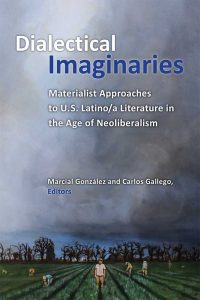Check out the essay I recently published as part of the collection, Dialectical Imaginaries: Materialist Approaches to U.S. Latino/a Literature in the Age of Neoliberalism, edited by Carlos Gallego and Marcial González.
 In “Bodega Sold Dreams: Middle-Class Panic and the Crossover Aesthetics of In the Heights,” I read In the Heights as representative of a middle-class politics that is haunted by the inability to speak for a working-class experience of Latinidad and threatened by the stereotypes of chaos and poverty associated with U.S. Latinx working-class subjectivities. In the Heights is troubled by the work of crossing over and by the history of how U.S. Latinxs have been depicted on the Broadway stage. While it focuses the concerns of a U.S. Latinx business class, the musical also references the ways that the artistic and activist legacy of the Nuyorican community challenges the priorities of cross-over consumption for Latinx culture and history. The nuances of the play’s cross-over aesthetics are flattened out by a reception that is fixated on delimited notions of cultural authenticity. I aim to complicate the expectation of authenticity attached to this play, peeling away the hyper-positive guise of pan-Latinidad celebrated by the reception and even at times the musical itself. In turn, I perform a reading of In the Heights that acknowledges: first, how the musical is in dialogue with a U.S. Latinx Civil Rights generation, and second, how the musical embodies a crisis of imagination and authority on the part of U.S. Latinx middle-class cultural creatives.
In “Bodega Sold Dreams: Middle-Class Panic and the Crossover Aesthetics of In the Heights,” I read In the Heights as representative of a middle-class politics that is haunted by the inability to speak for a working-class experience of Latinidad and threatened by the stereotypes of chaos and poverty associated with U.S. Latinx working-class subjectivities. In the Heights is troubled by the work of crossing over and by the history of how U.S. Latinxs have been depicted on the Broadway stage. While it focuses the concerns of a U.S. Latinx business class, the musical also references the ways that the artistic and activist legacy of the Nuyorican community challenges the priorities of cross-over consumption for Latinx culture and history. The nuances of the play’s cross-over aesthetics are flattened out by a reception that is fixated on delimited notions of cultural authenticity. I aim to complicate the expectation of authenticity attached to this play, peeling away the hyper-positive guise of pan-Latinidad celebrated by the reception and even at times the musical itself. In turn, I perform a reading of In the Heights that acknowledges: first, how the musical is in dialogue with a U.S. Latinx Civil Rights generation, and second, how the musical embodies a crisis of imagination and authority on the part of U.S. Latinx middle-class cultural creatives.